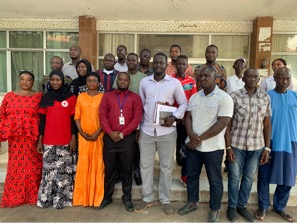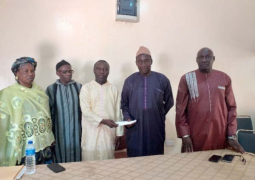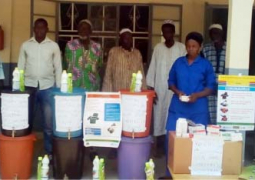
The meeting, focused on resource mobilisation, community engagement, and strategy implementation within the Greater Banjul Area and its surrounding regions. The Government of The Gambia, committed to reducing the spread of HIV, has taken critical steps to integrate the fight against this deadly disease into its national development agenda. Through the National AIDS Secretariat (NAS), the government has also decentralised its response mechanisms, establishing Municipal and Regional AIDS Coordinators across all six regions. This move aims to streamline efforts to combat the epidemic at both the regional and municipal levels.
In line with this mandate, the Municipal AIDS Committee, led by the Deputy Lord Mayoress of the Kanifing Municipal Council (KMC), has been mobilising stakeholders to help implement actions that will curb the spread of the disease across the Western One Health Region, which includes KMC, Banjul City Council (BCC), and Kombo North.
At the event, Abdou Aziz Dabakh Gaye, Deputy Mayor of Banjul City Council, expressed the Council's commitment to supporting HIV/AIDS awareness and prevention efforts.
"The National Response to HIV/AIDS, driven by our government, has made great strides, but it is only through continuous collaboration and collective action that we can sustain this momentum, especially within the Greater Banjul Area."
He acknowledged the leadership and dedication of the Deputy Mayor of KMC in her HIV response efforts, despite her absence at the meeting, and emphasised BCC’s readiness to play an active role in these initiatives.
Gibril Sanneh, chairperson of the Municipal AIDS Committee, urged local councils, particularly BCC, to increase their involvement in HIV awareness campaigns.
He highlighted that population spikes of urban areas and people’s high-risk behaviors, make them remain particularly vulnerable to the spread of HIV.
Sanneh emphasised the important role that local councils play in promoting public health. "By supporting awareness initiatives, BCC can empower its residents with crucial knowledge about prevention, testing, and treatment, especially among vulnerable groups such as youth and marginalised populations," he stated.
He further encouraged collaboration between local councils, health agencies, and community organisations, noting that this would enhance resource mobilisation, strengthen policy development, and foster a supportive environment for those affected by HIV.
"Ultimately, BCC's commitment can significantly reduce transmission rates and improve the overall health and well-being of the city's residents," Sanneh concluded.
Lamin Badjie, Monitoring and Evaluation Specialist at the National AIDS Secretariat, expressed gratitude to all stakeholders for their participation. He re-echoed that HIV affects everyone, either directly or indirectly, and called for widespread awareness across offices, households, and communities. "We must work together as one force to effectively combat this epidemic," Badjie stated.





